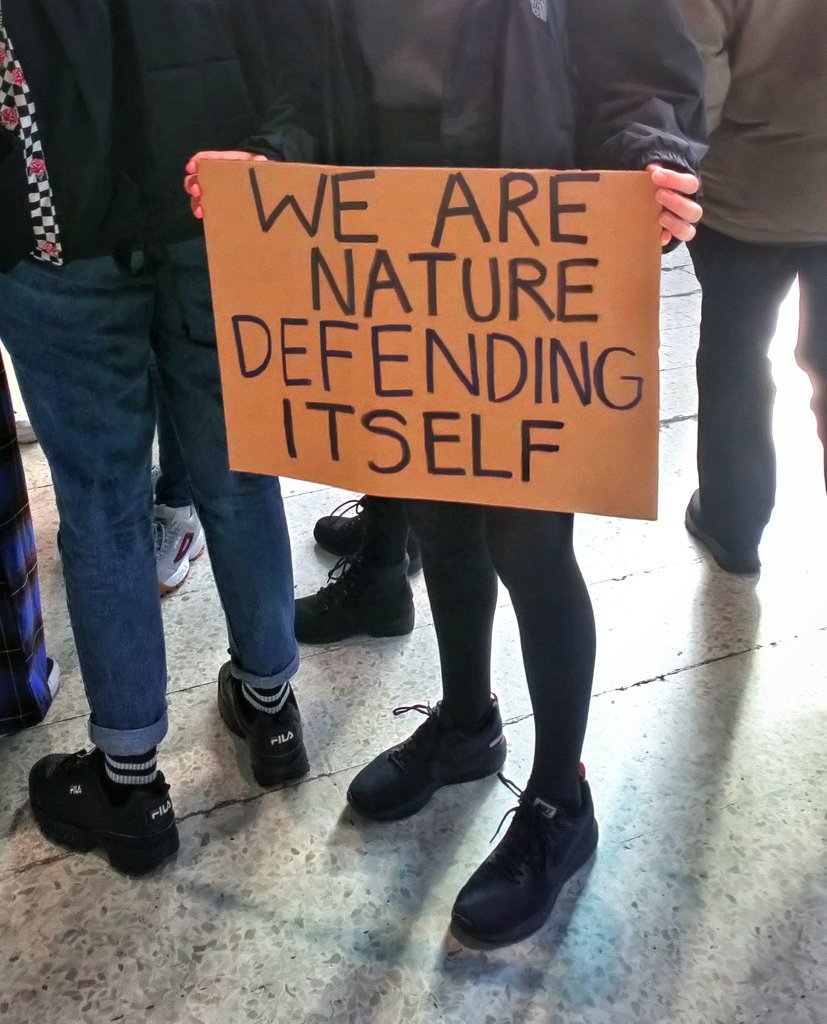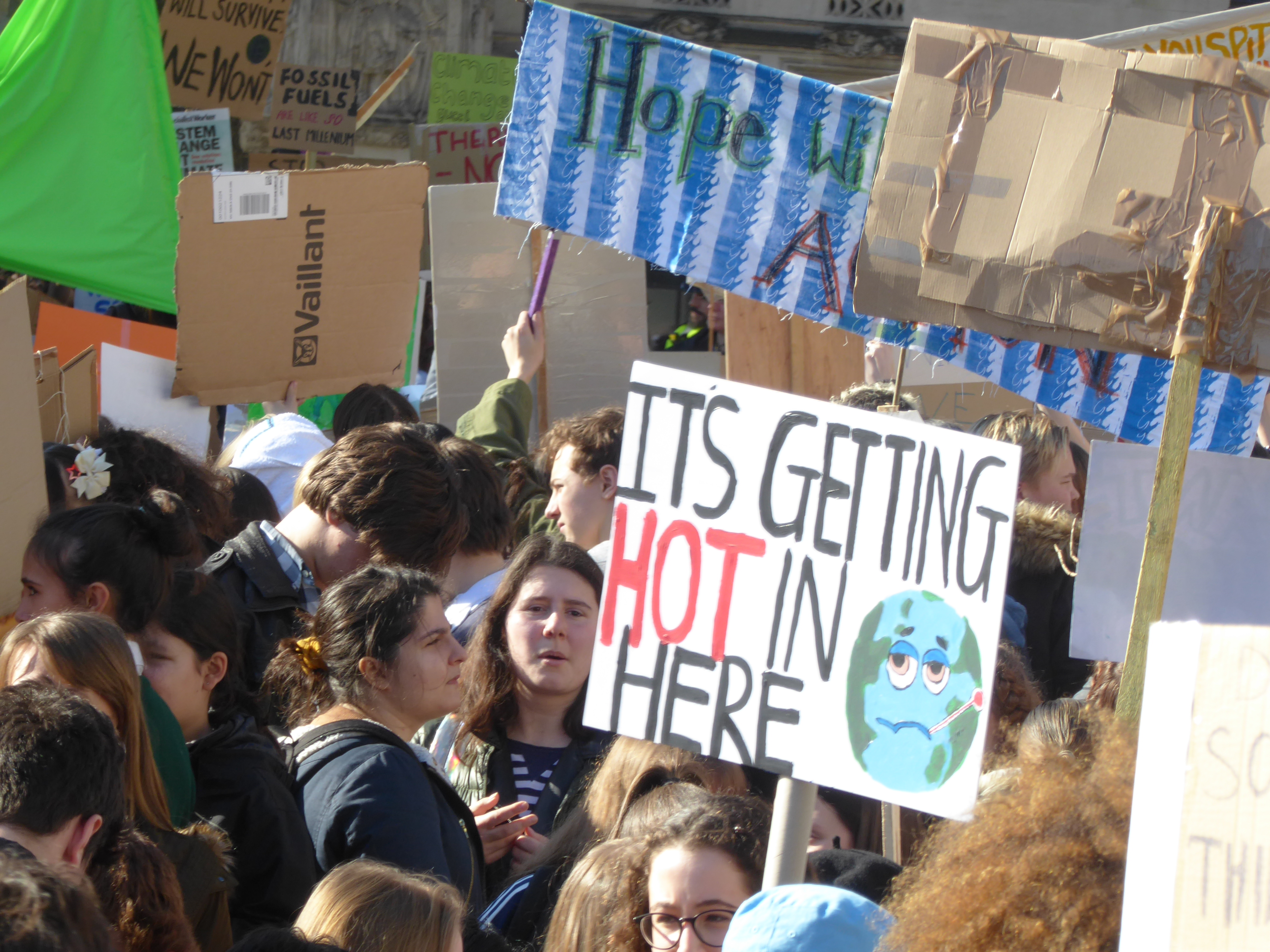
Many have wondered when the scale of public protest will match the scale of the climate crisis. That question increasingly is being answered by the sudden emergence and rapid spread internationally of the School Strike 4 Climate movement.
The uprising by school age children was triggered in August 2018 by a Swedish schoolgirl, Greta Thunberg, who sat outside the Swedish parliament building during school hours for several weeks in the run up to a national election with a sign spelling out ‘Skolstrejk för klimatet’(School Strike for the Climate). That summer, Sweden had witnessed a heatwave and dramatic forest fires in Sweden and she called on the Swedish government to take action to reduce carbon emissions in line with the Paris Climate Agreement.
Since then the school strike movement has spread across mainland Europe, to Australia before arriving on Friday 15th February to over 60 towns and cities across the United Kingdom.

In front of the House of Commons in Central London thousands of school children took over the streets outside Parliament bringing traffic to a standstill. What was planned as a demonstration then spontaneously turned into a march, with one placard reading, ‘We march now so we won’t have to swim later’, in a reference to seas rising in a warming world.
A buoyant mood among the protesters didn’t mask an extreme seriousness of purpose. School children marched under banners whose messages ranged from the heartfelt, ‘I am 14 years old and want a future,’ to the outraged ‘Why the actual f*** are we studying for a future we won’t even have?’ Others pointed fingers accusingly at those decision makers responsible with, ‘If you don’t act like adults we will’ and ‘If you can’t stand the heat get out of Parliament’ (with words ‘the kitchen’ crossed out). Other still simply said, ‘Don’t burn out future’, and ‘We are nature defending itself.’
 While the UK Prime Minister, Theresa May, was singled out for criticism, a spokesperson for her Downing Street office said that ‘everyone wants young people to be engaged in the issues that effect them,’ then went on to criticise the school children for ‘wasting time’ for being at the protests. In a coincidental riposte, one young protester carried a placard that read, ‘Stop wasting time on bloody Brexit – the planet needs us.’
While the UK Prime Minister, Theresa May, was singled out for criticism, a spokesperson for her Downing Street office said that ‘everyone wants young people to be engaged in the issues that effect them,’ then went on to criticise the school children for ‘wasting time’ for being at the protests. In a coincidental riposte, one young protester carried a placard that read, ‘Stop wasting time on bloody Brexit – the planet needs us.’
Responding to domestic pupil protests, the Australian the Prime Minister Scott Morrison called on children to be “a bit less activist.” In answer, fourteen year old Alicia Guiney carried a sign on the next school for climate strike that read, ‘We’ll be less activist if you’ll be less shit’.
https://talkradio.co.uk/radio/listen-again/1550212200# – 08.00-08.30 slot, starting at 26:00.
New social movements often emerge in moments of crisis or fresh realisation about an important issue. Campaigns such as #MeToo recently opposing sexism and the Arab Spring of a decade ago are examples. But this is the first time such a large-scale, international mobilisation has occurred on an issue of the deep sustainability of society among school children. It is a rapid transition in how young people are networking, organising and campaigning to protect their own futures, and to push for radically quicker action to prevent climate breakdown. No one is sure, yet, how it will evolve, but it is beginning to shake the complacency of an older generation preoccupied with its own, inward looking political disagreements.
Coordinated by a group of students under 18 years old, the UK school strikes initiative UKSCN which liaises with a range of other youth groups, also developed this set of four, clear, focused demands:
The Government declare a climate emergency and prioritise the protection of life on Earth, taking active steps to achieve climate justice.
The national curriculum is reformed to address the ecological crisis as an educational priority.
The Government communicate the severity of the ecological crisis and the necessity to act now to the general public.
The Government recognise that young people have the biggest stake in our future, by incorporating youth views into policy making and bringing the voting age down to 16.
Andrew Simms is Coordinator of the Rapid Transition Alliance, an author, political economist and activist. He is co-director of the NewWeather Institute, Assistant Director of Scientists for Global Responsibility, a Research Associate at the University of Sussex, and a Fellow of the New Economics Foundation (NEF). His books include The New Economics, Cancel the Apocalypse: the New Path to Prosperity, Ecological Debt and Do Good Lives Have to Cost the Earth? He tweets from @andrewsimms_uk
